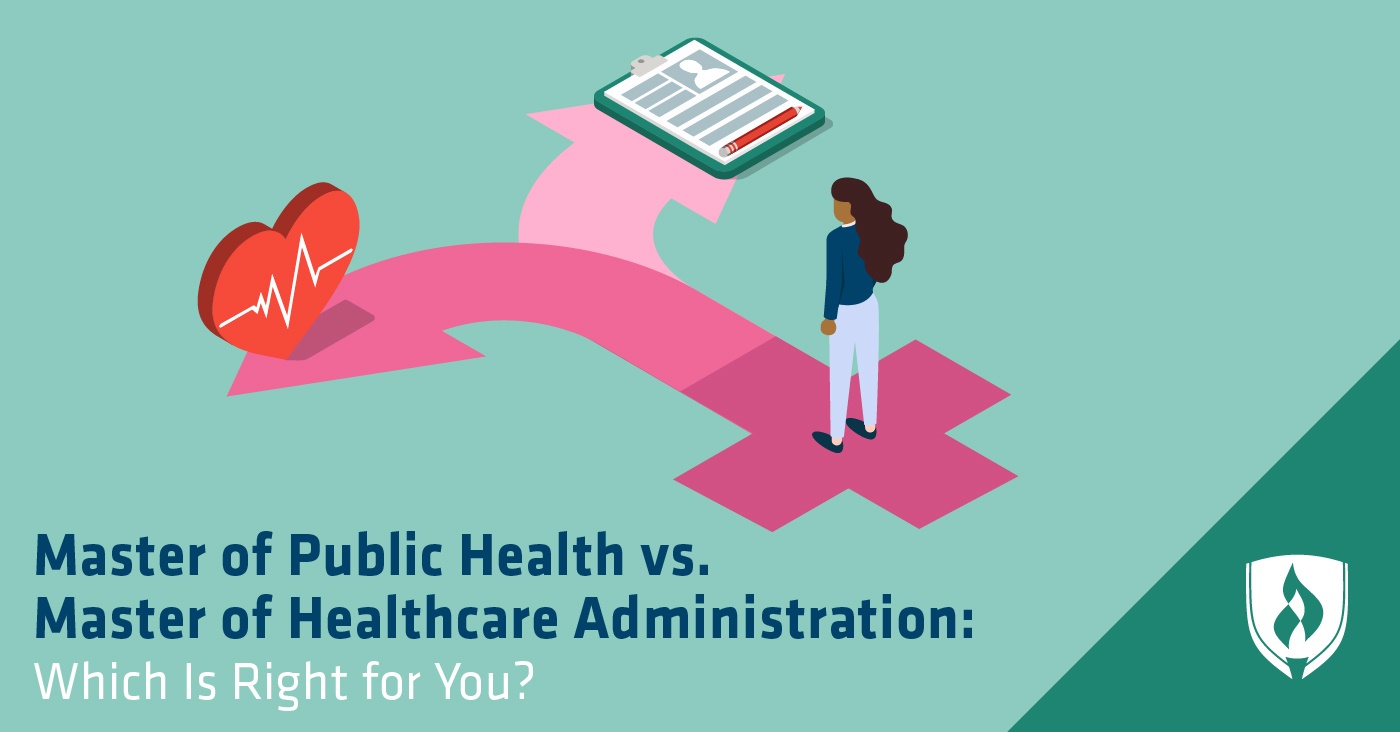Master of Public Health vs. Master of Healthcare Administration: Which Is Right for You?
By Will Erstad on 09/14/2020

Few fields have as direct and substantial of an impact on the lives of others as healthcare. Everyone needs to visit a doctor at some point in their lives, and those visits can bring monumental shifts in a patient’s life. Whether it’s the moment a family welcomes a newborn into their lives or receives the tough news of a cancer diagnosis, there’s no doubt this line of work matters.
While these individual moments are a great reminder of the gravity of a healthcare professional’s work, you’ve got your mind set on finding ways to expand your impact on this field at a scale that goes beyond individual patients. That’s what has led you to consider earning a healthcare-focused Master’s degree. But you’re struggling with which educational path will help you reach your goals: Master of Public Health versus Master of Healthcare Administration.
We’re breaking down the basics of the Master of Public Health (MPH) and Master of Healthcare Administration (MHA) programs at Rasmussen University so you can find the right fit for your future.
MPH vs. MHA: The basics
There is some obvious overlap in these two healthcare fields, as they are closely related. But there are some significant differences you should know about in order to choose the right course for your career.
The Master of Public Health program is designed to equip students with the skills they’ll need to help tackle larger scale public health issues. This include a focus on subjects like epidemiology, environmental health, risk management, and implementing evidence-based public health policies.
In contrast, the Master of Healthcare Administration program is more focused on the business and operations side of healthcare. These programs aim to develop business leadership competencies in the healthcare field. This includes a focus on topics like organizational planning, acting in accordance with healthcare regulations, and how to use data to drive changes that can improve efficiency and outcomes.
MPH vs. MHA: Courses to expect
Another way to help differentiate which of these programs best fits your needs is to take a closer look at what you’ll cover in your coursework. Let’s get right into it and explore a sampling of each.
Master of Public Health courses:
- Social Determinants of Health: This course provides an overview of the factors influencing health in local, national and global populations. Students will learn to develop strategies to mitigate health disparities and examine how factors like bias, cultural competency and health literacy affect outcomes in different populations.
- Epidemiology for Public Health Professionals: Students are introduced to epidemiological concepts in this course. They’ll cover topics like disease exposure modeling, transmission pathways and occurrence prevention. Additionally, they’ll learn the strengths and weakness of observational, qualitative and clinical study designs in epidemiological research. This course develops the skills needed to assess the scope and magnitude of risk factors influencing the health of a community.
- Population Health: This course will develop students’ knowledge of population health management principles and how to critically evaluate healthcare data from a variety of sources. By the end of the course, students will have the ability to develop population health projects using advanced techniques to identify ongoing and future healthcare concerns.
- Public Health Administration, Governance and Management: This course takes a look at how public health systems are organized, the policies governing them and the delivery of health programs at the local, state and federal levels. Students will learn how public health organizations collaborate and strategically plan to meet budgetary needs and maximize their effectiveness.
- Program Design and Evaluation: This course puts students in the driver’s seat as they identify a public health need and then create a public health program designed to address it. Along the way they’ll learn about funding grant proposals, managing budgets and timelines, goal planning and ways to build community stakeholder engagement.
Master of Healthcare Administration courses:
- Healthcare Policy, Ethics and Laws: This course helps students explore the current state of U.S. healthcare policy, the stakeholders influencing it and the challenges associated with reform efforts.
- Healthcare Financial Management and Economics: This course provides a foundation in economics and financial management in the current healthcare environment. Upon completion, students will know how to analyze financial statements, create financial plans and budgets and use key financial management tools.
- Healthcare Information Systems and Technology: Students in this course will learn how health information systems are used by leaders to form strategies designed to improve patient outcomes and business performance.
- Healthcare Operations Management: In this course, students will learn techniques needed to evaluate and improve organizational performance. They will develop the skills needed to apply strategies for increasing organizational efficiency, reducing costs and improving patient care outcomes.
- Healthcare Leadership and Human Resources: This course develops students’ healthcare-focused HR competencies. Along the way students will learn about organizational behavior, change management, strategic workforce planning, conflict resolution and negotiation—all through the lens a healthcare provider.
Both of these programs at Rasmussen University are offered in an online competency-based education format that places an emphasis on applied, practical learning. Often, students learn best by doing, so coursework may involve projects like developing and proposing a public health program, or creating a working financial budget that supports improved patient and business outcomes.
MPH vs. MHA: Related career outcomes
Of course, interesting course material alone isn’t likely to be your only criteria. You’re a practical person and need to know what sorts of career opportunities you can pursue upon graduating. Let’s take a look at both.
What can you do with a Master of Public Health degree?
The Master of Public Health program at Rasmussen University helps prepare students for a broad array of public health careers in domains such as epidemiology, public health research and informatics, health policy and administration, environmental health and risk management and community health education.
Common public health job titles include:
- Epidemiologist
- Community health director
- Data analyst
- Health director
- Policy analyst
What can you do with a Master of Healthcare Administration degree?
The Master of Healthcare Administration program is designed to position graduates for a variety of leadership roles typically found at healthcare providers—whether that’s the small local clinic, an assisted living facility, a hospital or in the administration of a large healthcare system.
Common healthcare administration job titles include:
- Clinical director
- Health services manager
- Practice manager
- Long-term care administrator
- Policy analyst
Both education paths can lead to an interesting and practical variety of opportunities within the healthcare field. Generally speaking, the MPH programs prepare students for working in positions aimed at positively influencing health outcomes at scale—whether as a leader in the organization or as contributor to policy analysis and research. The MHA program best prepares students for working in roles that involve the day-to-day planning and operations of a healthcare provider.
MPH vs. MHA: Which path will you pursue?
When it comes to healthcare, there are quite a few graduate-level programs and disciplines to explore and potentially pursue. By now you should be more familiar with the nuances of public health versus healthcare administration.
Both fields have a positive impact on the community and offer rewarding career opportunities. It all comes down to which is more in line with your personal passions and proficiencies.
Interested in pursuing public health? Visit the Rasmussen University Master of Public Health program page to learn more. If healthcare administration sounds like the better fit, visit the Master of Healthcare Administration program page.
Related Articles:




